Continuous Learning: Elevating Your Talent Game
Learn strategies to stay ahead in your career, enhance your skills, and embrace lifelong learning for personal and professional growth.
Table of contents

Learn strategies to stay ahead in your career, enhance your skills, and embrace lifelong learning for personal and professional growth.
Continuous learning, also known as lifelong learning, is the ongoing process of acquiring new skills and knowledge to enhance personal and professional development. This can include anything from taking online courses and attending workshops to listening to podcasts and shadowing colleagues. The beauty of continuous learning lies in its versatility, encompassing various types and formats, such as formal education, social learning, and self-directed study.
It not only helps you stay competitive and adaptable in your career but also fosters innovation and productivity within organizations. It opens up new career opportunities, increases earning potential, and leads to personal enrichment, truly elevating your talent game.
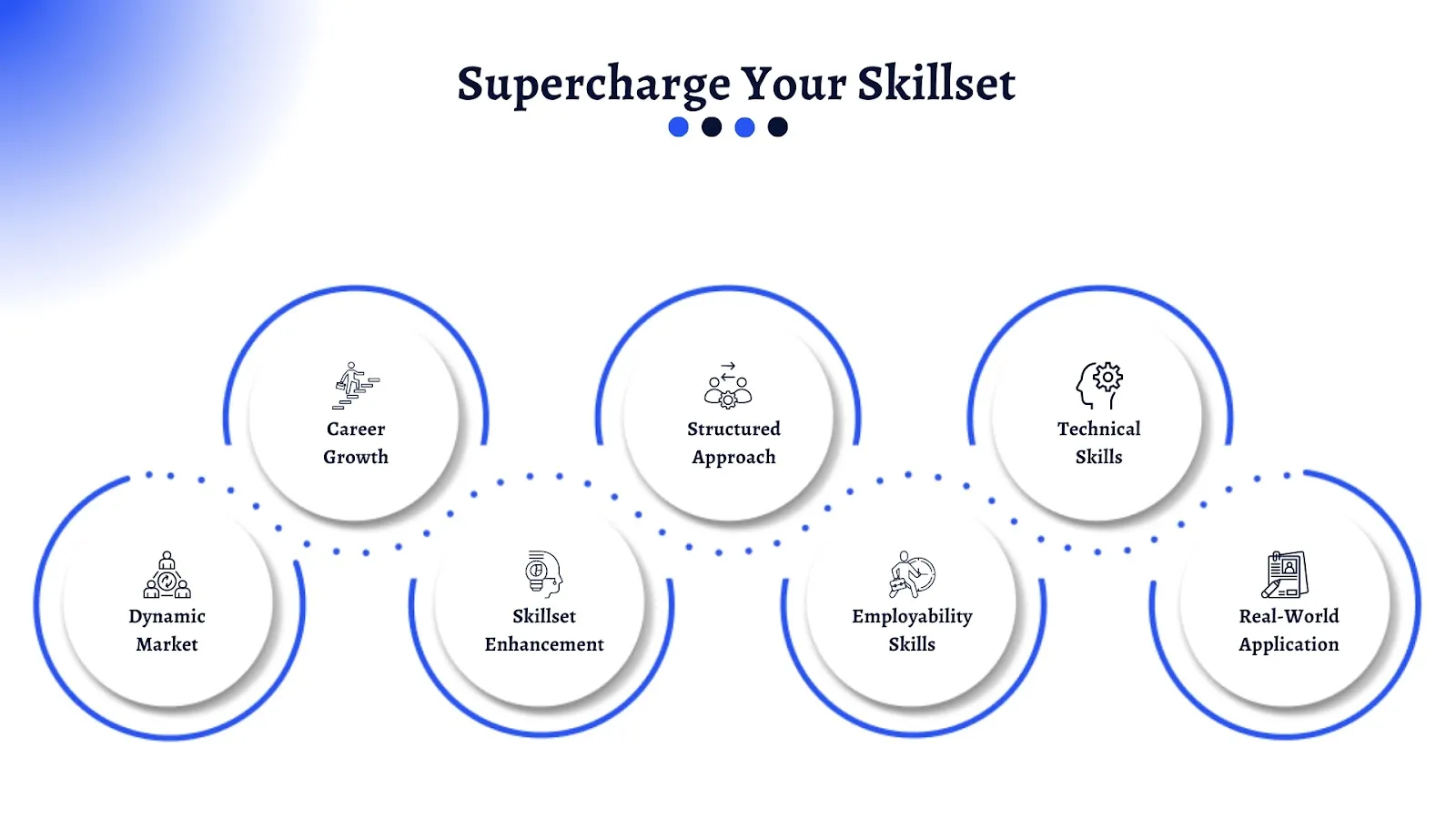
In today's dynamic job market, continuously updating your skills is essential for career growth and staying relevant. This guide provides a structured approach to enhancing your skillset, ensuring you are well-prepared to meet the demands of your industry and achieve your professional goals. Let's dive into each step to supercharge your learning journey.
Dwarkanath CK, an employability consultant, emphasizes the importance of staying employable by constantly updating your skill set. “Anyone interested in planning and building a career must become employable and learn to remain employable regardless of changes in the environment,” he says. To achieve this, he suggests focusing on three main areas: employability skills, self-knowledge, and perception of the environment.

Dwarkanath outlines several key skills needed for employability. Hard skills specific to your discipline are crucial, but so are transferable skills like communication, teamwork, and critical thinking. He also highlights the importance of competency assessment and development, stressing the need to create and implement an Individual Development Plan (IDP). “It’s not just about acquiring skills, but also about continually assessing and developing your competencies,” he explains.
Especially if you are struggling with finding a job or feeling stuck in your current role, learning in-demand skills can be a game-changer. NoCode Institute offers programs designed to help you discover and develop the skills you need to stay competitive. By focusing on both technical and transferable skills, you can build a robust skillset that opens doors to new opportunities and career growth.
Learn how to align your goals, enhance your skills, and maintain a fulfilling professional life by adopting these 5-steps to achieve long-term career satisfaction.
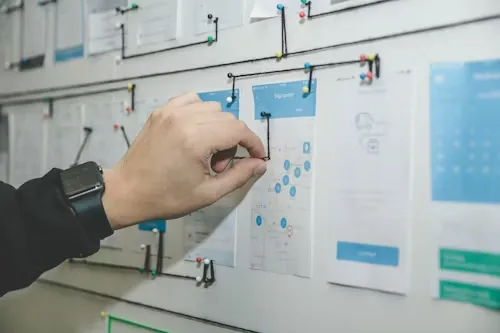
IamFlok, a user from freeCodeCamp, shares his journey of turning a hobby into a full-fledged career. Initially dabbling in coding with basic knowledge of Python, C++, and web development through platforms like Drupal and WordPress, he decided to take his passion seriously and pursue a career in programming. While working as a software development manager, he familiarized himself with agile methods, scrum, and sprints, realizing their importance to potential employers.
To transition into web development, IamFlok dedicated significant time to studying online courses on C++ and Java. His learning journey accelerated when he could focus full-time on studying web development and working on projects like building a website using the MEAN stack. “My progress really boosted up when I had to quit my full-time job in July 2017. I had now time to study web development full time, 8-12 hours a day,” he recalls. This intensive study period allowed him to build a strong foundation, ultimately leading to a job offer where his self-taught skills and willingness to learn were highly valued.
IamFlok has a good tech background, but if you are not confident, no code programs like Nocode Foundations are perfect for building a tech career without attending a single hackathon. NoCode Institute offers guidance and resources to help you outline your career goals, set realistic milestones, and stay motivated throughout your learning journey. By developing a structured plan, you can ensure continuous growth and make informed decisions about your professional development.

Nádia Silveira, a seasoned graphic and web designer, experienced a significant transformation in her career through the "Descodifica-te" course at NoCode. “As a designer, I learned No Code tools that allow me to present websites to clients in a much more efficient way, saving me a lot of time and effort in the future,” she shared.
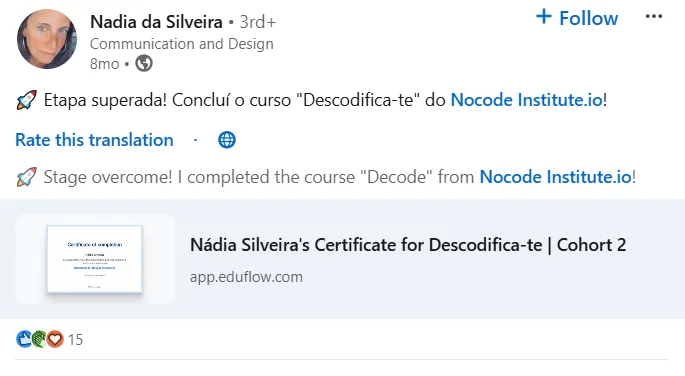
But beyond the technical skills, Nádia cherished the community formed during the course. “We created a community of incredible women always ready to support each other and overcome challenges together,” she added. This sense of community echoed the African proverb she adapted: "If you want to go fast, go alone; if you want to go far and have fun along the way, go together."
Similarly, Avany Santos Souza found immense value in the NoCode Fast Track program in partnership with Santander OpenAcademy. “During the course, I got to know tools for no-code development of database solutions, web, and mobile applications,” Avany noted. This expanded her professional toolkit and enhanced her offerings to clients. The course also provided her with the opportunity to connect with other students, creating a supportive network that enriched her learning experience.
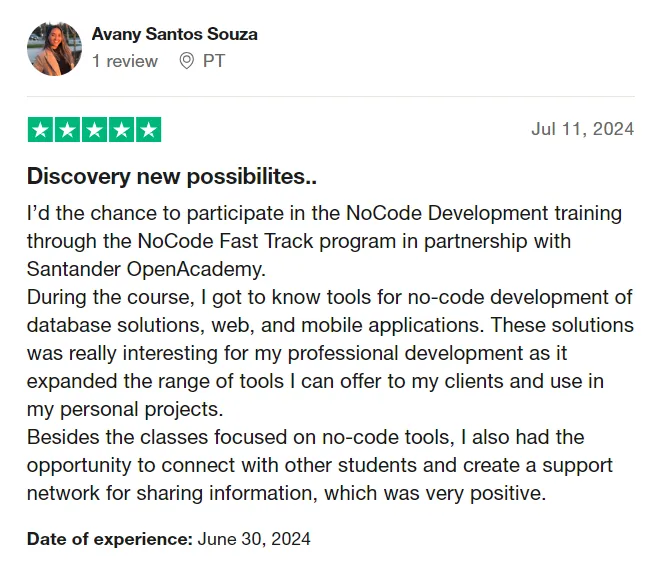
For those aiming to enhance their skills and stay relevant in a rapidly evolving job market, leveraging online learning platforms is a game-changer. NoCode Institute offers comprehensive programs that not only equip you with in-demand technical skills but also foster a supportive learning community. By enrolling in these courses, you can expand your professional capabilities and connect with like-minded individuals, paving the way for continuous growth and success. 16 scholarships and grants for reskilling programs you need to know.
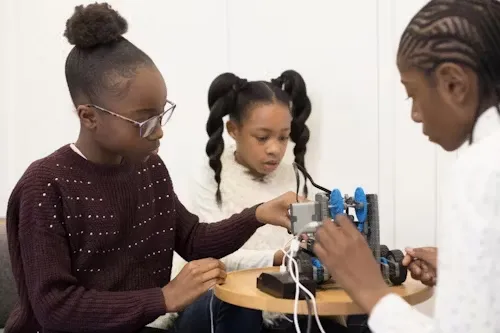
Stephen Warley's journey is a compelling example of how applying skills in the real world can transform your career. Initially following a traditional career path, Stephen found himself deeply unsatisfied despite holding prestigious roles. His turning point came when he embraced his passion for helping others discover their potential and started applying his skills in new and meaningful ways. Transitioning from an employee to a solopreneur, Stephen focused on building a business that aligned with his values and strengths. This shift not only led to professional fulfilment but also allowed him to craft a career that provided both freedom and purpose.
Throughout his career, Stephen encountered numerous challenges that required him to continuously adapt and apply his skills creatively. He leveraged his experiences in media and digital sales to develop ‘Life Skills That Matter’, a platform dedicated to helping individuals design work that works for them. By sharing his story and the lessons learned along the way, Stephen demonstrates the power of real-world application in achieving career success. "I believe everyone’s story deserves to be told, but everyone also owes it to themselves to discover their own authentic story," he emphasizes. His journey highlights the importance of being open to new opportunities and using your unique skills to create a fulfilling and sustainable career path.
The key lies in telling your story and finding practical ways to apply your skills. NoCode Institute provides hands-on learning experiences that enable you to apply what you’ve learned in real-world projects, enhancing your employability and opening doors to new opportunities. By engaging in these practical applications, you can build confidence and demonstrate your value to potential employers or clients.
After losing his job one October, Greg Roche began reaching out to former colleagues and acquaintances, which led to a series of chance meetings that changed his entire belief system. "As you are cultivating your professional network, be ready to make a new connection in every situation," Greg advises.
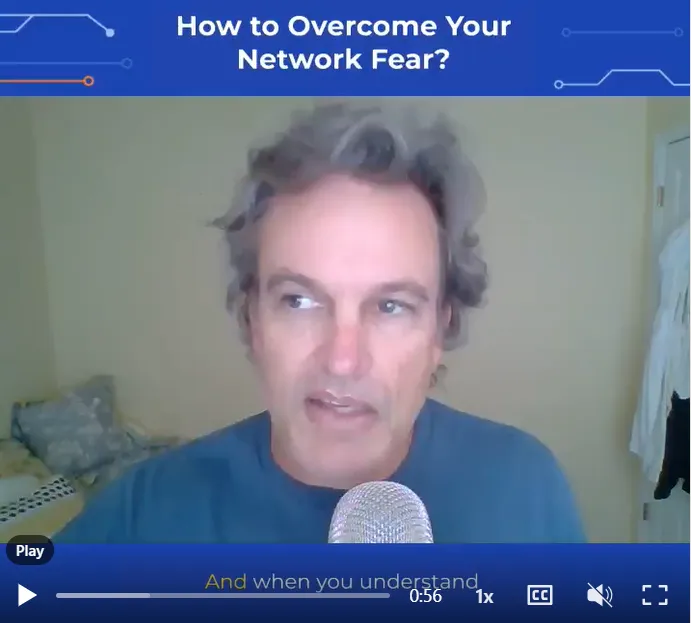
One day, while Christmas shopping, Greg bumped into an old colleague, Kristie. She suggested he meet Dennis, another job seeker. Their conversation led Greg to meet Jorge, whose experience in HR was deeper than his own. This chain of connections ultimately brought Greg into contact with Jim and then Dick, who had an open HR position. By this time, Greg already had a job but realized the role would be perfect for Jorge and facilitated the introduction.
Greg was surprised by the odds of Gorge meeting Dick. But the top industry leaders use this chain-networking everyday. For example, David Pich, the CEO of AIM, says, “Uber drivers are fascinating. They aren’t career drivers and have done interesting things. By engaging with Uber drivers, I have met many intriguing people, adding value to my professional network in unexpected ways.”
The lesson to learn is making human connections is a significant part of continuous learning. For example, people from different backgrounds participate in the cohort programs by NoCode Institute but leave as a community, connected and ready to help each other. This becomes an important part of learning which you can hear directly from the horse’s mouth.
Discover these effective networking strategies to uncover hidden job opportunities and advance your career.
In the summer of 2021, Robin Lespagnol made the bold decision to leave a comfortable job at a startup to pursue new challenges and experiences. This leap wasn't just about changing jobs but about embarking on a journey of self-discovery and continuous learning. Robin spent the early part of 2022 sharing this journey on LinkedIn, which sparked numerous questions from his network. Many were curious about the risks and rewards of such a significant career shift. Robin's story resonated with others contemplating a similar move, providing a beacon of hope and practical advice.
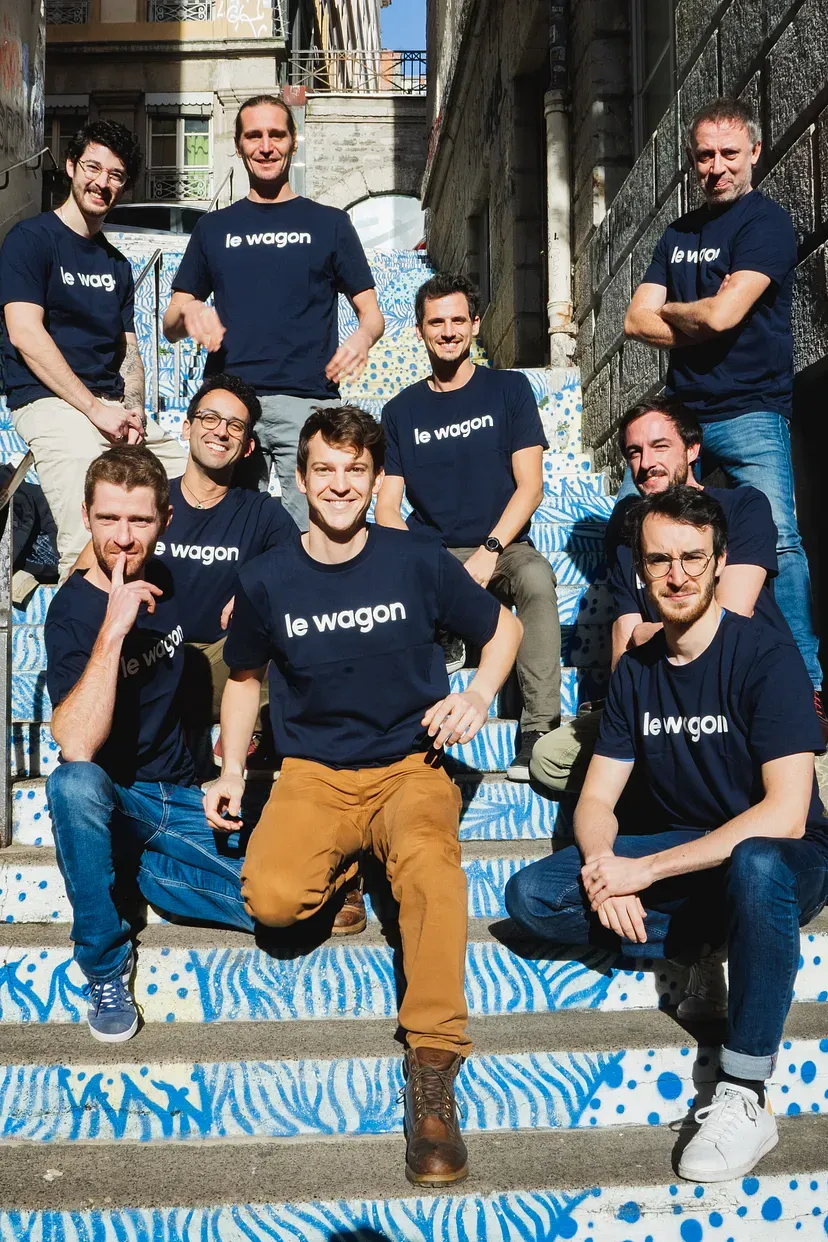
Robin emphasizes the importance of retraining and iterating as a crucial part of professional growth. After taking a break to travel and reflect, he dove into learning data science at Le Wagon. This intensive program equipped him with valuable new skills and broadened his professional horizons. "Learning data science was the best financial investment ever," Robin shares. By embracing a mindset of continuous learning and adaptation, Robin successfully transitioned into freelancing.
He managed to secure his first clients, navigate financial uncertainties, and maintain a healthy work-life balance. "I’m not certain of remaining a freelance for years, but the aim of meeting new teams, new sectors, and new problems to solve is achieved," Robin reflects. His journey underscores the power of retraining and iteration in achieving a fulfilling and dynamic career.
It often happens that you may feel insignificant and unsatisfied in your current job. Learn more about the signs you need a career change. If you do, assess yourself for it and use the power of upskilling and reskilling to get a job through no code skills.

Reflecting and adjusting your learning path is crucial for career growth and adaptability. According to Hubstaff, “Companies like Google and Automattic have shown the value of regular reflection. Google's ‘20% Time’ initiative allows employees to dedicate a portion of their work hours to personal projects, which has led to innovations like Gmail and Google News… Similarly, GE’s 360-degree feedback system provides comprehensive insights from multiple perspectives, driving personal and professional growth.”
Sindhu Priya Sadineni's journey offers a personal example of how reflecting and adjusting your learning path can lead to success. During her job search, Sindhu began by scrutinizing job descriptions to identify the skills required for her desired roles. "I found lacking skills in the job role I want to be," she recalls. This realization led her to pursue internships, where she could gain practical experience and improve her skill set.
Through her internships, particularly the third one with JOBDAE, Sindhu acquired valuable hands-on knowledge that significantly enhanced her employability. She emphasizes the importance of internships in developing both technical and soft skills. "When you want to start your career, check for the options and ways to adhere to the position you want to be in," Sindhu advises. By continuously reflecting on her experiences and adjusting her learning path, Sindhu successfully positioned herself for a rewarding career.
As the job landscape changes with technology, you will also need to adapt. Many jobs will become obsolete or may require technical skills to do. Understandably, everyone can’t be a computer engineer. Looking at these scenarios, no-code programs are the best way to keep you updated as they help you adapt and adjust your learning path.
Enhancing newly acquired skills is pivotal in staying ahead in a constantly evolving workplace. As industries transform, the ability to adapt and continually learn becomes essential. Developing a proactive approach to professional growth ensures you can navigate the future of work with confidence. By embracing new learning strategies and remaining open to change, you can stay relevant and competitive in your field, ultimately achieving long-term career success.
NoCode Institute plays a crucial role in fostering continuous learning, equipping you with the tools and knowledge necessary to excel in today's job market. With a focus on practical skills and real-world applications, NoCode offers a range of programs designed to help you transition into tech roles seamlessly. Whether you're looking to upskill or pivot your career, NoCode provides the resources and support you need to thrive. Join NoCode today and take the first step towards enhancing your professional journey. Start your learning adventure now and unlock endless job opportunities!
Looking to re-invent yourself and turn your talent into a career? Stay up to date with the latest.